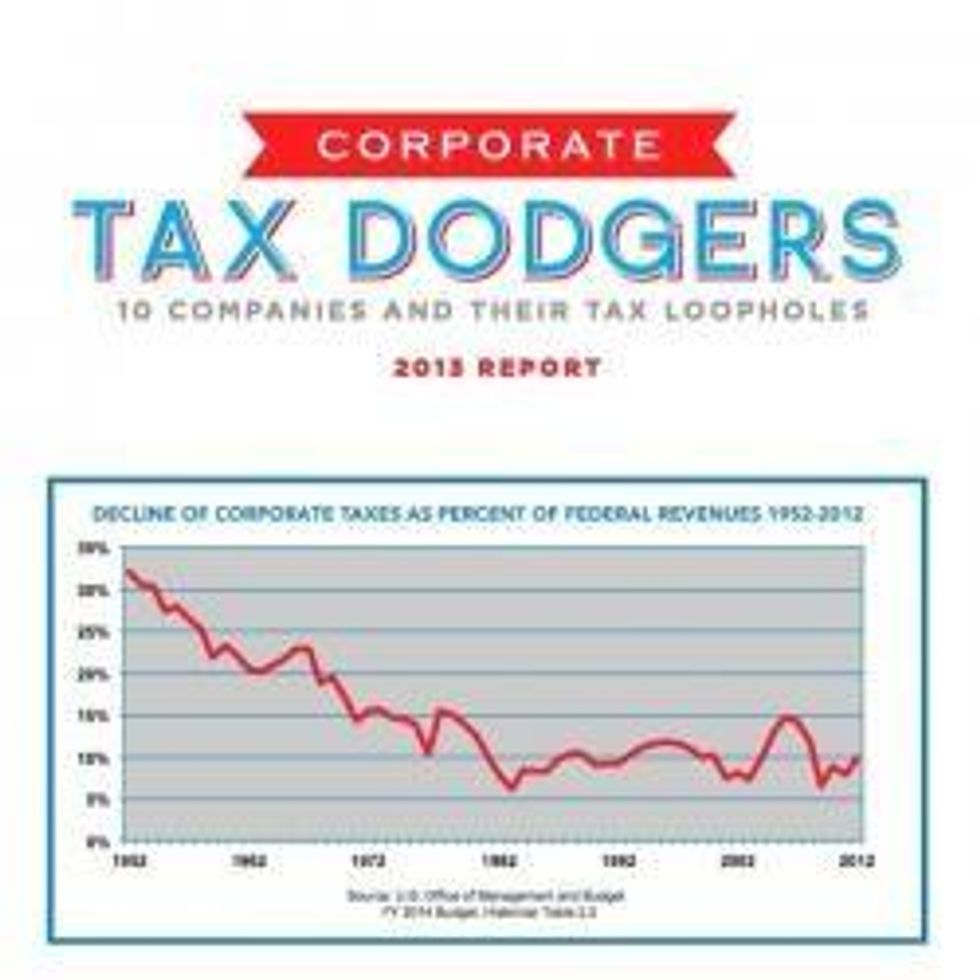As the budget battles in Washington continue, corporations have stepped into the fray with some of the most aggressive lobbying we've seen in years - calling for cuts to corporate tax rates, a widening of offshore tax loopholes that already cost the U.S. Treasury $90 billion a year, and cuts to government services and benefits, including Social Security and Medicare.
In making their case, corporate executives decry the U.S.'s 35% corporate tax rate claiming it is the highest in the world and makes their businesses uncompetitive globally. The evidence suggests otherwise.
Corporate profits are at a 60-year high, while corporate taxes are near a 60-year low [See Figure]. U.S. stock markets are at record levels, and American CEOs are paid far more than executives who run firms of similar size in other nations. Many U.S. corporations pay a higher tax rate to foreign governments than they do here at home.
America's 35% tax rate is the highest among industrialized nations, but very few companies pay anything like those rates. Total corporate federal taxes paid fell to 12.1% of U.S. profits in 2011, according to the Congressional Budget Office. The average profitable company in the Fortune 500 paid just 18.5% of its profits in federal income taxes between 2008 and 2010, according to Citizens for Tax Justice, a nonpartisan tax research organization. Dozens of large and profitable companies paid nothing in recent years.
HIGHLIGHTS OF 10 CORPORATE TAX DODGERS
Bank of America
Had $17.2 billion in profits offshore in 2012 on which it paid no U.S. taxes. Reported it would owe $4.3 billion in U.S. taxes if profits are brought home.
Citigroup
Had $42.6 billion in profits offshore in 2012 on which it paid no U.S. taxes. Reported it would owe $11.5 billion in U.S. taxes if profits are brought home.
ExxonMobil
Paid just a 15% federal income tax rate from 2010-2012, less than half the official 35% corporate tax rate - a tax subsidy of $6.2 billion. Had $43 billion in profits offshore in 2012 on which it paid no U.S. taxes.
FedEx
Made $5.7 billion from 2010-2012 and didn't pay a dime in federal income taxes. Got a tax subsidy of $2.1 billion. Received $10.3 billion in federal contracts from 2006-2012.
General Electric
Made $88 billion from 2002-2012 and paid just 2.4% in taxes for a tax subsidy of $29 billion. Paid no taxes in 4 years. Had $108 billion in profits offshore in 2012 on which it paid no U.S. taxes. Received $21.8 billion in federal contracts from 2006-2012.
Honeywell
Made $5 billion from 2009-2012 and paid just $50 million in federal income taxes - a tax subsidy of $1.7 billion. Had $11.6 billion in profits offshore in 2012 on which it paid no U.S. taxes. Received $16.7 billion in federal contracts from 2006-2012.
Merck
Made $13.6 billion and paid $2.5 billion in federal income taxes from 2009-2012. Paid an 18.4% federal income tax rate, half the official 35% rate - a tax subsidy of $2.2 billion. Had $53.4 billion in profits offshore in 2012 on which it paid no U.S. taxes. Received $8.7 billion in federal contracts from 2006-2012.
Microsoft
Saved $4.5 billion in federal income taxes from 2009-2011 by transferring profits to a subsidiary in the tax haven of Puerto Rico. Had $60.8 billion in profits stashed offshore in 2012 on which it paid no U.S. taxes; reported it would owe $19.4 billion if profits are brought home.
Pfizer
Received $2.2 billion in federal tax refunds from 2010-2012 while earning $43 billion worldwide even though 40% of its sales are in America. Had $73 billion in profits offshore in 2012 on which it paid no U.S. income taxes. Received $3.4 billion in federal contracts from 2010-2012.
Verizon
Made $19.3 billion in U.S. pretax profits from 2008-2012 but paid no federal income taxes during the period; instead got $535 million in tax rebates. Total tax subsidy: $7.3 billion. Received up to $6 billion in federal contracts from 2011 through 2023.
Fixing the Game, Designing the Rules
CEOs who are the face of various corporate pro-austerity, anti-tax campaigns with names like Fix the Debt, The LIFT America Coalition, The RATE Coalition and even the long-standing Business Roundtable, preach a theory that cutting corporate taxes is "pro-growth." But they neglect to say that the growth is of their corporate bottom lines, not the economy and certainly not social well-being.
Though many of these austerity crusaders have corporate retirement plans that will provide tens- and even hundreds of thousands of dollars PER MONTH in their retirement, these CEOs shamelessly argue for cutting monthly Social Security benefits and raising the retirement age to 70 - which automatically reduces seniors' retirement benefits by 20%.
It wasn't always this way. There was a time, not so long ago, when America's largest businesses did not question the need for taxes to pay for investments in education, infrastructure and basic research that benefited businesses and citizens alike. It was from these investments that things like computers, the Internet and life-saving drugs and medical technology emerged in life-changing ways.
In 1952, under Republican President Dwight D Eisenhower, corporate income taxes were nearly a third of the federal government's receipts but had declined to less than 10% by 2012. This is due to a corporate tax code riddled with loopholes, perks and preferences won by corporate lobbyists and backed by millions of dollars of campaign gifts to Members of Congress.
This report looks at 10 U.S. corporations that have used an array of tax loopholes and corporate subsidies to slash their tax bills. Here are a few of the loopholes and subsidies:
The offshore tax loophole. This gaping loophole costs the U.S. Treasury $90 billion a year by letting corporations ship profits and jobs overseas. It was originally established to encourage U.S. multinational corporations to expand their businesses into other countries; for instance, to encourage car manufacturers to build plants and sell cars in Germany or England. If profits from those sales were reinvested in new and better plants overseas, that money would not be subject to U.S. income taxes. But starting a couple of decades ago, corporate tax attorneys and accountants found ways to stretch this concept and set up ways for companies to register intellectual property, such as patents or trademarks, in low-tax nations, called tax havens.
When a product is sold in America, a chunk of the purchase price is sent to the tax haven to pay for use of the patent, and these funds escape U.S. taxes. One of the companies profiled in this report is Microsoft, which sends 47 cents of every U.S. sales dollar to Puerto Rico to pay for patents on discoveries largely made in the United States. Pfizer has turned these tax-avoiding paper transactions into an art form - it sells 40% of its drugs here but hasn't reported any U.S. profits in five years. Merck and Citigroup also benefit from offshore tax loopholes.
The excessive CEO pay tax dodge. This loophole was created in 1993 when Congress passed legislation seeking to cap the deductibility of executive compensation to no more than $1 million per year per executive. Companies could continue to pay whatever they wanted, taxpayers just wouldn't be subsidizing more than the first $1 million per executive. As the bill moved through Congress, a loophole was inserted that exempted all pay considered to be "performance based." Rather than reining in pay, the effect of the law with the loophole intact was an explosion of stock-based compensation. This loophole costs the U.S. Treasury $8 billion a year. Honeywell is one of the company's profiled that has used this loophole to save on its taxes.
The corporate malfeasance tax dodge. When you get a parking ticket or a speeding ticket, come tax day you are out of luck because such fines are not tax deductible. But if you are a corporation, the costs of corporate crimes and abuse are most often tax deductible, in effect forcing other taxpayers to subsidize their abusive behavior. When Bank of America paid to settle claims that its foreclosure practices violated the rights of customers who lost their homes or when ExxonMobil paid $1.1 billion to settle claims for the Exxon Valdez oil spill, their tax deductions of these costs meant the rest of us picked up some of the tab for their harmful practices.
The paying business to do what it would do anyway tax subsidy. Several companies profiled were able to sharply cut their taxes by taking advantage of special tax write-offs associated with the 2009 stimulus bill. Corporations have long been allowed to deduct a portion of the cost of their property and equipment over the life of the asset. But the 2009 law allowed companies to immediately write-off 50% of the value of the equipment in the year the purchase was made, regardless of how long the equipment was expected to last. While the intent of the legislation was to get businesses to spend more to stimulate the economy, in reality most companies got enormous tax breaks for doing what they were going to do anyway. FedEx and Verizon are big beneficiaries of this subsidy as they buy aircraft and build cell phone towers.
Bank Bailout, round 2. America's taxpayers spent more than $2 trillion to bailout America's financial institutions during the recent banking crisis. But the terms of the bailout did not address whether the financial institutions involved could use the losses incurred during the crisis to reduce their taxes for years to come, in effect, giving them a second bailout. Bank of America used its losses as a get-out-of-taxes free card. Many other banks and financial institutions did the same.
IT DOESN'T HAVE TO BE THIS WAY
There are two bills in Congress that would close some of these loopholes and ensure that some companies pay their fair share of taxes.
The Cut Unjustified Tax Loopholes Act (S. 268, introduced by Sen. Carl Levin (D-MI)) would close offshore loopholes by establishing command and control provisions that would treat foreign subsidiaries controlled from America as U.S businesses for tax purposes. It would also end some of the deductions corporations presently enjoy from stock-option based pay of corporate executives, and close some of the oil and gas subsidies in the tax code.
The Corporate Tax Dodging Prevention Act (S. 250, introduced by Sen Bernie Sanders (I-VT) and H.R. 694, introduced by Rep. Jan Schakowsky (D-IL)) would end the current practice of deferral that allows companies to avoid taxes on offshore profits, both those earned offshore and those shifted there through accounting gimmicks. This bill would tax the global profits of U.S. corporations and provide for a 100% foreign tax credit for any taxes paid to foreign governments. It would raise $590 billion over ten years according to the Congressional Joint Committee on Taxation.
There is widespread and growing public opinion among the American public and the small business community that corporate tax loopholes need to be closed so we have the money to invest in a more promising future. This support is seen across the political spectrum. Corporate tax dodging is not a Republican issue or a Democratic issue, it is an American issue. The American people are saying it is long past time that corporations step up and pay their fair share to fix the debt and assure that our country has sufficient public investment to create opportunities for all to succeed in their life, their liberty and the pursuit of happiness for them and their families.




